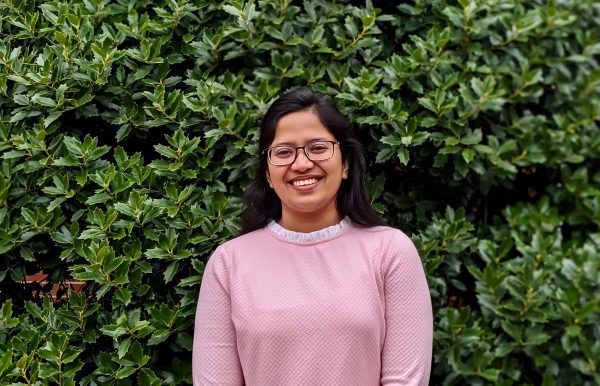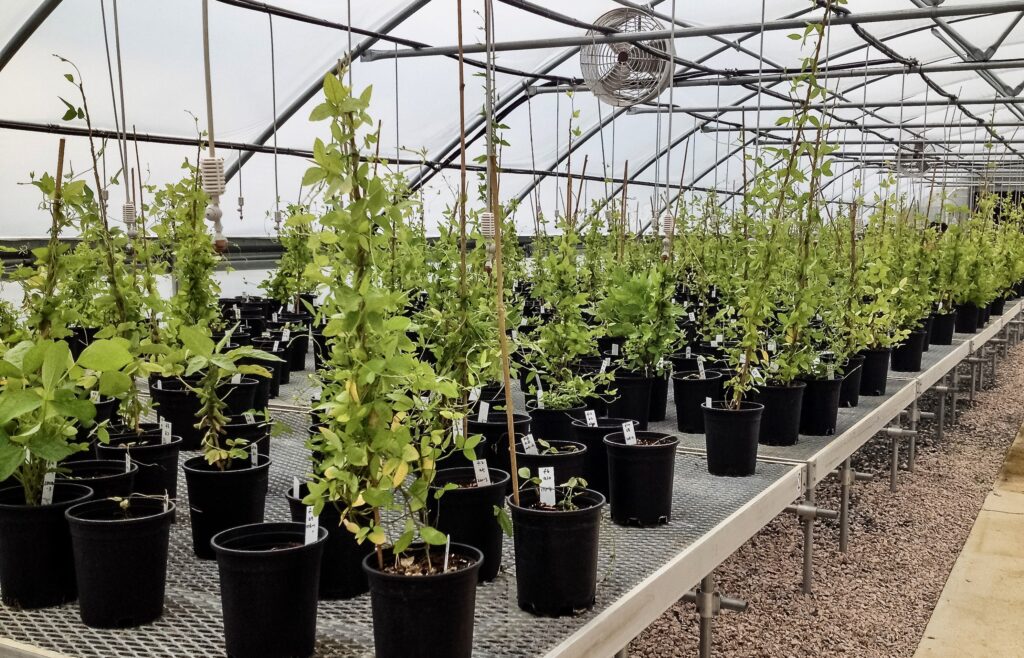Biology Doctoral Student Addresses World’s Food Scarcity Through Wild Soybean Research

Biology doctoral student Farida Yasmin is advancing her research into the wild soybean and its potential to address worldwide food scarcity, growing her impact and her knowledge.
Yasmin has received a third round of support from the Schlumberger Foundation, through its prestigious Faculty for the Future Fellows program. The funding came through a competitive process and supports her research in UNC Charlotte researcher Bao Hua Song’s lab into novel biotic stress resistance mechanisms of the wild soybean. Her third round of funding started in August 2020.
Broadly, Song’s research team focuses on understanding molecular mechanisms and the evolution of plant biotic and abiotic stress response, using crop wild relatives as study systems. They apply their research to real-world problems, such as crop improvement and human health.
Keeping her native land of Bangladesh close to her heart, Yasmin has come to UNC Charlotte to research the wild soybean, which, as a critical global resource, provides more than half of the world’s vegetable oils and proteins.
Yasmin is seeking ways to improve the plant’s resistance to the most devastating pest affecting the soybean worldwide – the soybean cyst nematode, a small plant-parasitic roundworm – through cutting-edge omics technology.
Her ultimate goal is to help alleviate hunger and poverty in her home country and worldwide, and to inspire women and girls to pursue STEM careers.
In a second important success for Yasmin, she was one of just 16 young plant scientists from around the globe chosen to attend the highly competitive “Frontiers and Techniques in Plant Science” short course at Cold Spring Harbor Laboratory, a leading international center for research and education. She received support from the National Science Foundation for her attendance at the course.
Since 1981, the course has trained 562 researchers in the latest techniques and approaches in plant science, with a view to preparing the next generation of plant biologists to work at the interface of biological, computational, and physical sciences.
“This course was a window opening onto a whole new, much bigger view of the plant biology world,” Yasmin said. “This intensive course included an international cohort of four instructors and 24 guest speakers who are the pioneers of plant science. Many of them are members of the National Academy of Sciences and Fellows of The Royal Society.”
Yasmin describes the connections she made with fellow students and instructors as an opportunity for future collaboration and advice. “This was the experience of a lifetime,” she said. “The interactions boosted my confidence and helped me in building an analytical and creative research mindset.”
In a third accomplishment, Yasmin is a co-author on a review paper that was published in the journal Current Opinion in Plant Biology with Song and Hengyou Zhang, who was a research associate in Song’s plant biology lab.
The paper, “Neglected treasures in the wild – legume wild relatives in food security and human health,” considers the opportunity that wild legumes can offer in global crop productivity, particularly with their genetic diversity.

“Wild legumes represent a large group of wild species adaptive to diverse habitats and harbor rich genetic diversity for the improvement of the agronomic, nutritional, and medicinal values of the domesticated legumes,” the authors wrote.
“Accumulating evidence suggests that the genetic variation retained in these under-exploited leguminous wild relatives can be used to improve crop yield, nutrient contents, and resistance/tolerance to environmental stresses via the integration of omics, genetics, and genome-editing technologies,” they said.
This work was supported by the National Institute of General Medical Sciences, the North Carolina Soybean Producers Association, North Carolina Biotechnology Center, North Carolina State University Plant Pathways Elucidation Project Consortium, and University of North Carolina at Charlotte.
Song describes how Yasmin’s accomplishments and her leadership can produce a ripple effect. “I believe such success stories help to encourage fellow students here at UNC Charlotte,” she said. “This will help to create social value and impact through other student scholars’ efforts.”
Words: Lynn Roberson | Images: Courtesy of the Song lab | Learn more about Yasmin’s work in a previous story about her.